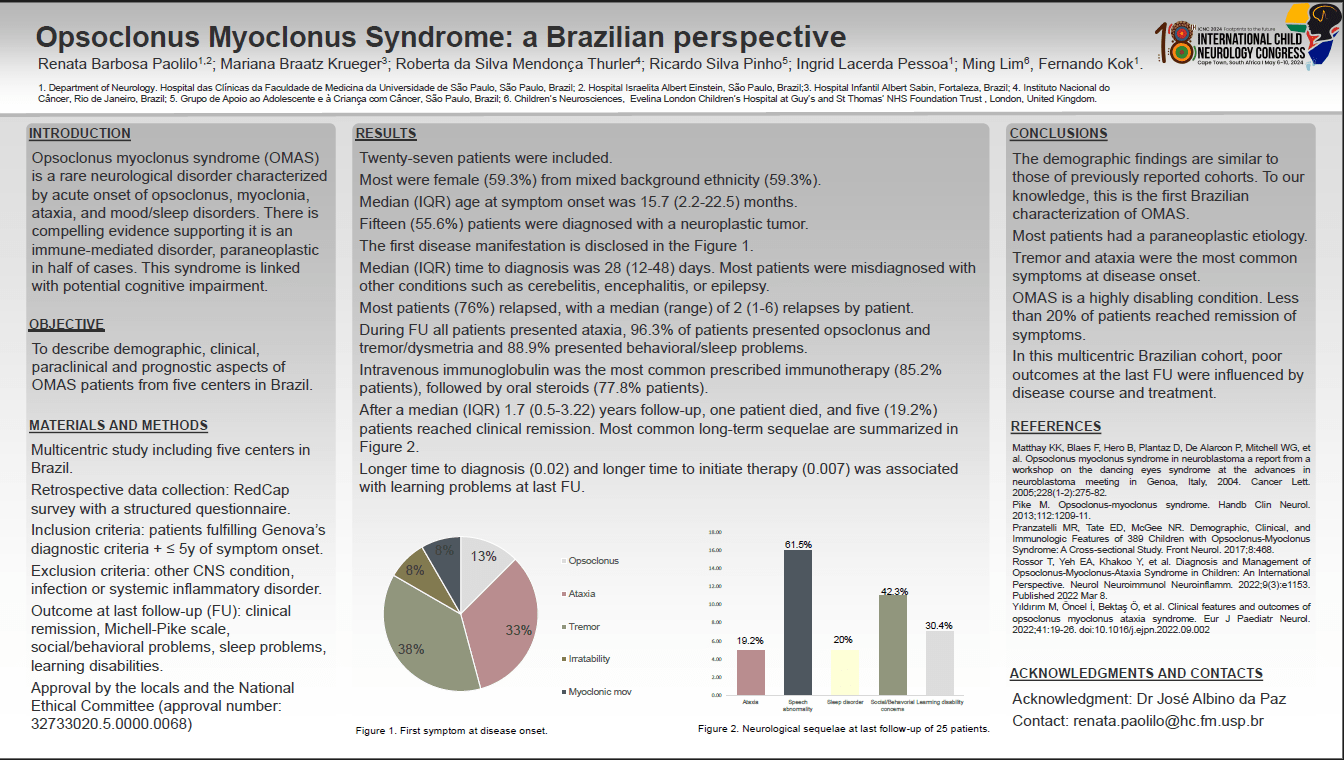Opsoclonus Myoclonus Syndrome: A Brazilian Perspective
Introduction/Aims Opsoclonus myoclonus syndrome (OMAS) is a rare neurological disorder characterized by acute onset of opsoclonus, myoclonia, ataxia, and mood/sleep disorders. There is compelling evidence supporting it is an immune-mediated disorder, paraneoplastic in half of cases. This syndrome is linked with potential cognitive impairment. We aim to describe demographic, clinical, paraclinical and prognostic aspects of OMAS patients from five centers in Brazil.
Methods Multicentric study of OMAS patients from Brazil Patients were included if they fulfilled Genova’s diagnostic criteria and were follow for less than 5 years since disease onset. Data was retrospectively collected. Outcome at last follow-up (FU) were measured by clinical remission, Michell-Pike scale, social/behavioral problems, sleep problems, learning disabilities at last follow-up.
Results Twenty-seven patients were included. Most were female (59.3%) from mixed background ethnicity (59.3%). Median (IQR) age at symptom onset was 15.7 (12.2-22.5) months. Tremor/dysmetria and ataxia were the most common disease first manifestation. Median time to diagnosis was 28 days. Most patients (76%) relapsed, with a median (range) of 2 (1-6) relapses by patient. Intravenous immunoglobulin was the most common prescribed immunotherapy, followed by oral steroids. At last FU, one patient died, 19.2% patients reached clinical remission, 42.3% patients had behavioral problems and 26.9% patients had learning disabilities. Longer time to diagnosis (0.02) and longer time to initiate therapy (0.007) was associated with learning problems at last FU.
Conclusion OMAS is a highly disabling condition. In this multicentric Brazilian cohort poor outcome at last FU was influenced by disease course and treatment.
Renata Paolilo
São Paulo University
Brazil
Mariana Krueger
Hospital Infantil Albert Sabin
Brazil
Roberta Thurler
Instituto Nacional do Cancer
Brazil
Ricardo Pinho
Grupo de Apoio ao Adolescente e a Criança com Cancer
Brazil
Ingrid Pessoa
Unversity of São Paulo
Brazil
Ming Lim
Evelina London Children’s Hospital at Guy’s and St Thomas’ NHS Foundation Trust, King’s Health Partners Academic Health Science Centre; Department Wom
United Kingdom
Fernando Kok
São Paulo University
Brazil

Ming Lim
Evelina London Children’s Hospital at Guy’s and St Thomas’ NHS Foundation Trust, King’s Health Partners Academic Health Science Centre; Department Wom
United Kingdom